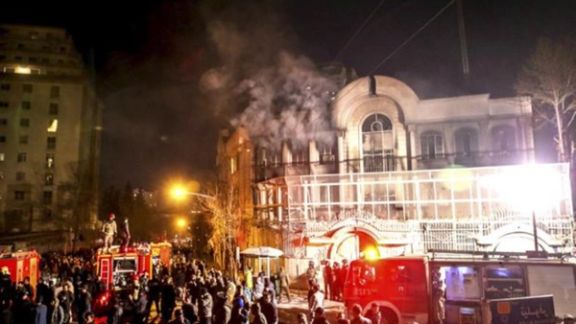Iran Lawmaker Says Saudi Signs Of Better Relations ‘Losing Their Luster’

Saudi Arabia’s interest in improving relations with Iran is diminishing, according to a member of the Iranian parliament’s National Security and Foreign Policy Committee.

Saudi Arabia’s interest in improving relations with Iran is diminishing, according to a member of the Iranian parliament’s National Security and Foreign Policy Committee.
While Tehran and Riyadh – which have no formal diplomatic relations – back different sides in various regional conflicts, including Syria and Yemen, the two sides have held several rounds of exploratory talks in Baghdad.
"There were signals of Saudi's interest in reviving relations, but these signs have currently lost their luster a little,” parliamentarian Mahmoud Abbaszadeh-Meshkini told Shafaqna (Shia News Association) Friday. “Some signals have even turned into their opposite."
While Iran had "repeatedly announced that we seek improvement of relations,” Abbaszadeh-Meshkini said, the “groundwork” required before “official” talks had not been carried out. The parliamentarian also suggested that Iran's foreign policy was now more "focused on Asia and neighboring countries."
President Ebrahim Raisi (Raeesi) took office in August announcing a desire to improve Shia-Sunni relations, within Iran and across the region, as well as developing better ties with neighbors. Raisi’s goal might be to reduce Western pressure for discussing Iran’s regional behavior that has seriously alarmed Sunni states and Israel.
Saudi Arabia severed relations with Iran in January 2016 after a mob attacked its diplomatic missions in Tehran and Mashhad. The embassy in Tehran was set on fire and looted while Iranian security forces stood by.
Raisi’s foreign minister Hossein Amir-Abdollahian, who is speaks Arabic, held responsibility for Arab affairs as deputy foreign minister (2011-16) and was ambassador to Bahrain 2007-2010.
Last month hopes were widely expressed over restoring Saudi-Iran diplomatic relations, even of re-opening consulates in Mashhad and Jeddah as a goodwill gesture before the two sides addressed tricky issues like Yemen, where Saudi Arabia has been engaged for seven years in a costly and bloody war against Ansar Allah fighters with Iranian backing.
‘A very dangerous place’
But Saudi Foreign Minister Prince Faisal bin Farhan al-Saud said October 15 that Iran was accelerating its nuclear activities and thereby putting the region in “a very dangerous place.”
Iran’s foreign ministry said October 31 after four rounds of talks with Saudi Arabia that reopening of embassies would "take some time.” Prince Faisal noted that “solid progress had been made” that was “positive enough to allow for further discussion beyond, but nothing concrete as of yet.”
Conservative and hardline media in Iran this week condemned Saudi Arabia for expelling the Lebanese ambassador, banning Lebanon’s imports and demanding the resignation of Lebanon’s information minister George Kordahi after reports emerged of remarks he made before becoming a minister in which he described the Saudi intervention in Yemen as “aggression.”
Lebanon’s prime minister Najib Mikati, a Sunni, again called Thursday for Kordahi, a Christian, to step down to avoid further Saudi escalation as Riyadh rallied support for its move among other Sunni-led Gulf states, including Kuwait and the United Arab Emirates. Some analysts have interpreted the Saudi action as indirectly targeting the Allawi-led government in Syria, which is battling mainly Sunni rebels backed by Saudi Arabia, or even targeting Iran, whose Shia ally Hezbollah is supporting Kordahi.